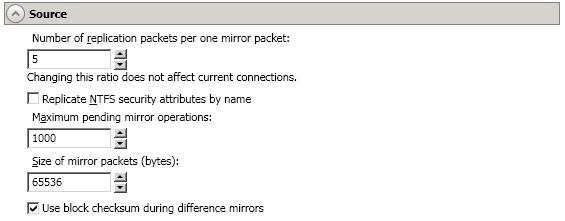

|
These properties are specific to the source server role.

Replicate NTFS security attributes by name—Double-Take Availability allows you to replicate Windows permission attributes by local name as well as security ID (SID). By replicating Windows security by name, you can transmit the owner name with the file. If that user exists on the target, then the SID associated with the user will be applied to the target file ownership. If that user does not exist on the target, then the ownership will be unknown. By default, this option is disabled.
If you enable this option, make sure that the same groups and users exist on the target as they do on the source. Additionally, you must enable this option on your target server before starting a restoration, because the target is acting like a source during a restoration.
Enabling this option may have an impact on the rate at which Double-Take Availability can commit data on the target. File security attributes are sent to the target during mirroring and replication. The target must obtain the security ID (SID) for the users and groups that are assigned permissions, which takes some time. If the users and groups are not on the target server, the delay can be substantial. The performance impact of enabling this option will vary depending on the type of file activity and other variables. For instance, it will not affect the overall performance of large database files much (since there is a lot of data, but only a few file permissions), but may affect the performance of user files significantly (since there are often thousands of files, each with permissions). In general, the performance impact will only be noticed during mirrors since that is when the target workload is greatest.
Regardless of the security model you are using, if you create new user accounts on the source, you should start a remirror so the new user account information associated with any files in your job can be transmitted to the target.
Use block checksum during difference mirrors—This option allows a file difference mirror to check each block of data, regardless of the file attributes. If this option is disabled, Double-Take Availability will assume files are synchronized if their attributes match.
Database applications may update files without changing the date, time, or file size. Therefore, if you are using database applications, you should enable Use block checksum during difference mirrors to ensure proper file comparisons.
If you are not using database applications, disabling this option will shorten mirror times.